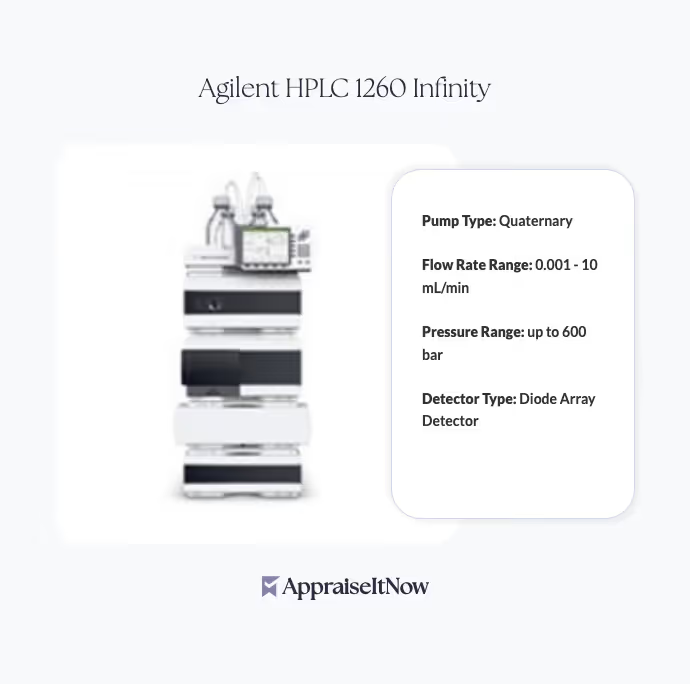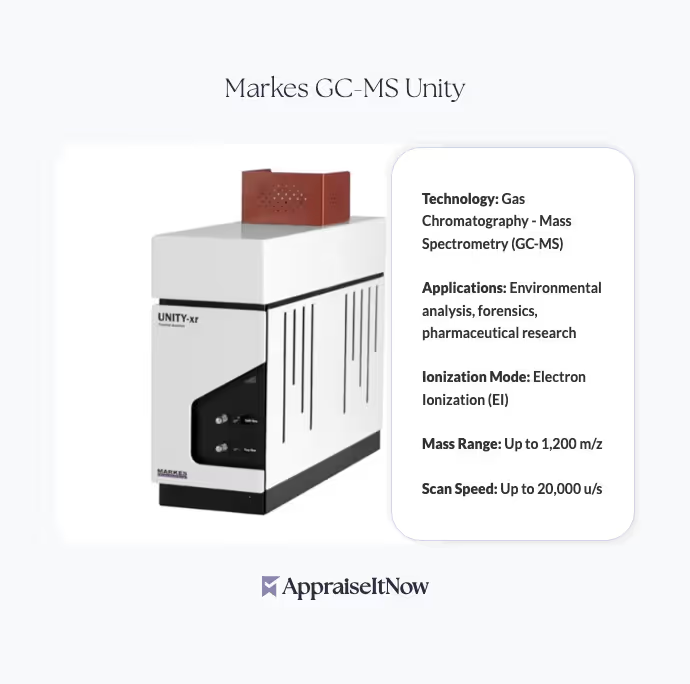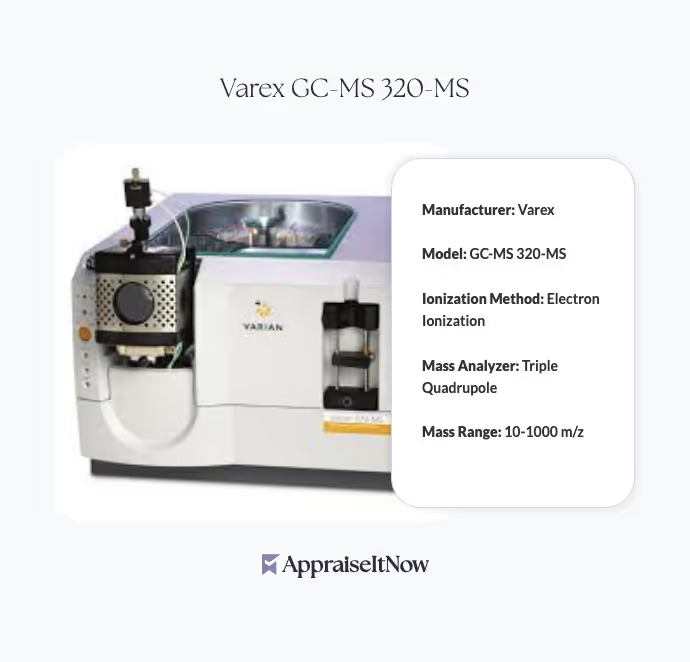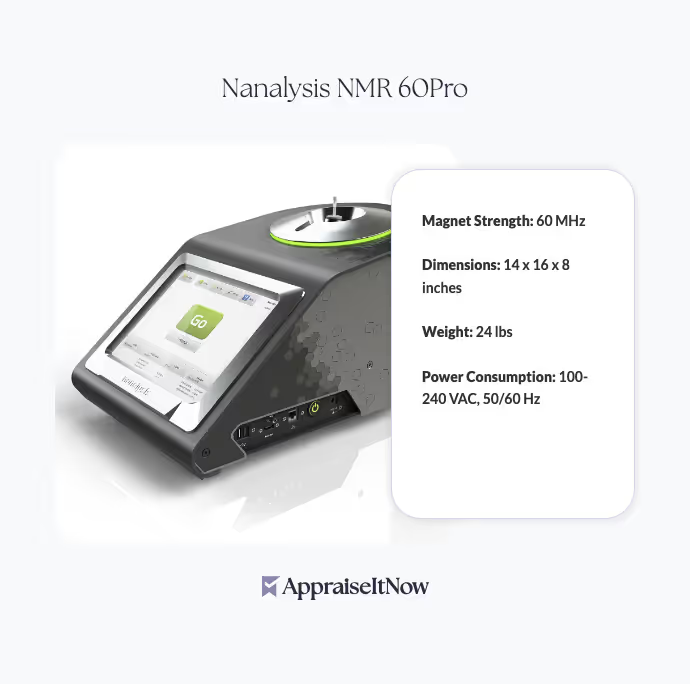<h1>How to Get Your Agilent HPLC 1260 Infinity Appraised</h1>
<p>If you own an Agilent HPLC 1260 Infinity system, you likely understand its value to analytical research and quality control operations. Whether you're planning to sell this sophisticated instrument, need insurance documentation, or require valuation for tax purposes, a professional appraisal becomes essential. With current market estimates placing the <strong>Agilent HPLC 1260 Infinity value between $75,000 and $95,000</strong>, understanding the appraisal process helps you achieve accurate valuations and make informed business decisions.</p>
<h2>Understanding the Agilent HPLC 1260 Infinity's Market Position</h2>
<p>The Agilent HPLC 1260 Infinity stands as one of the most sought-after high-performance liquid chromatography systems since its introduction in 2010. This modular, versatile platform serves pharmaceutical companies, environmental laboratories, research institutions, and contract research organizations (CROs) worldwide. Its state-of-the-art technology, combined with Agilent's reputation for reliability and precision, makes it a valuable asset in the analytical instrumentation market.</p>
<p>Your 1260 Infinity's worth reflects more than just hardware value—it represents the system's capability to perform rapid, high-resolution separations with automated sample handling and precise flow rate control. These technical characteristics directly influence what buyers are willing to pay and what insurers will cover. Understanding current <a href="/blog/how-to-determine-the-fair-market-value-for-lab-equipment">market prices and recent sale comps</a> for similar HPLC systems provides context for realistic valuation expectations.</p>
<div class="callout tip"><p><strong>Market Insight</strong></p>
<p>Configuration and module availability significantly impact value. A fully equipped 1260 Infinity with multiple detectors and autosamplers typically commands 15-20% premiums over base configurations.</p></div>
<h2>What Factors Most Affect Your System's Resale Value</h2>
<p>When appraisers evaluate an Agilent HPLC 1260 Infinity, several interconnected factors determine where your system falls within that $75,000-$95,000 range. Understanding these value drivers helps you position your instrument competitively if you're considering a sale or need accurate insurance coverage.</p>
<p><strong>Age and maintenance history</strong> serve as primary value indicators. While your 1260 Infinity represents current-generation technology with years of productive life remaining, systems purchased closer to 2010 require careful assessment of remaining useful life. Appraisers examine service records, calibration documentation, and maintenance logs to establish condition grades and projected functionality. Systems with consistent professional servicing typically retain 10-15% higher value than those with irregular maintenance histories.</p>
<p><strong>Specific configurations and modules</strong> dramatically affect valuation. Your system's detector array, pump capabilities, autosampler features, and column specifications all factor into the final appraisal. A 1260 Infinity equipped with UV, refractive index, and electrochemical detectors carries substantially more value than a system with basic UV detection alone. Similarly, systems featuring quaternary pumps, sophisticated autosamplers with temperature control, and integrated data systems command premium pricing in the used equipment market.</p>
<p><strong>Warranty status and calibration currency</strong> influence both immediate value and buyer confidence. Systems with remaining manufacturer warranties or recently completed factory calibrations reduce buyer risk, justifying higher purchase prices. Conversely, instruments requiring immediate recalibration or warranty expiration within six months may see 8-12% value reductions during appraisal.</p>
<p>Documentation quality becomes increasingly important at this price point. Professional appraisers look for complete original documentation, including system manuals, software licenses, validation reports, and column compatibility records. Systems with comprehensive documentation typically appraise 12-18% higher than those with incomplete paperwork, as buyers face reduced risk during acquisition and integration into their operations.</p>
<h2>Gathering Essential Documentation for Your Appraisal</h2>
<p>Accurate appraisal of your <a href="/types/lab-equipment">lab equipment</a> depends heavily on the supporting documentation you provide. Rather than attempting an appraisal with minimal information, compile a comprehensive package that demonstrates your 1260 Infinity's condition, capabilities, and maintenance history.</p>
<p>Professional appraisers require <strong>photographs from multiple angles</strong> showing the system's physical condition, display interface, detector configurations, and any visible wear or damage. Include close-up images of the touchscreen control interface, pump modules, and column compartment. High-resolution documentation helps appraisers assess cosmetic condition remotely and establish accurate grading without requiring on-site visits for standard valuations.</p>
<p>Your <strong>service and calibration records</strong> constitute the most critical documentation. These records establish that your system has been professionally maintained and remains reliable. Factory calibration certificates, service invoices from authorized Agilent service centers, and any validation reports from your organization demonstrate diligent stewardship. If your 1260 Infinity has undergone method validation or process qualification testing, include these documents—they prove the system's accuracy and reliability in critical applications.</p>
<p><strong>Original purchase documentation, warranties, and software licenses</strong> significantly strengthen your appraisal package. Include the original invoice, serial number verification, installed software versions, and any remaining warranty coverage. Systems with valid software licenses have substantially higher value than those with expired or missing licenses, as replacement licensing can cost thousands of dollars. When exploring what documentation, service/calibration records, and photographs should clients provide to get an accurate appraisal for lab equipment, having comparable recent sales data or market surveys helps appraisers benchmark your instrument accurately.</p>
<p>Include <strong>column inventory and included accessories</strong>. Document the columns currently installed or available with your system, plus any autosamplers, detectors beyond the base configuration, and peripherals like fraction collectors or inline degassers. These additions often represent $5,000-$15,000 in additional value depending on type and condition.</p>
<div class="callout note"><p><strong>Documentation Priority</strong></p>
<p>Systems with complete, organized documentation packages typically complete appraisal within 5-7 business days. Incomplete documentation often requires appraiser site visits, extending timelines to 2-3 weeks and adding evaluation costs.</p></div>
<h2>How Appraisers Determine Condition Grades and Remaining Useful Life</h2>
<p>Professional appraisers evaluating your Agilent HPLC 1260 Infinity use standardized methodologies to assess condition and project remaining useful life. Understanding this process helps you recognize realistic valuations and identify areas where your system's presentation impacts final appraisal value.</p>
<p><strong>Physical condition assessment</strong> begins with cosmetic evaluation—examining the instrument's external appearance, display quality, and overall cleanliness. Appraisers grade cosmetic condition on a standard scale from "like new" through "functional," noting any dents, discoloration, or component wear. At the $75,000-$95,000 price point, cosmetic condition significantly influences buyer perception, even though slightly worn systems often perform identically to pristine examples.</p>
<p><strong>Functional assessment</strong> requires technical evaluation of critical components. Appraisers verify pump pressure stability, detector responsiveness, autosampler precision, and data system functionality. Systems demonstrating stable performance across specified parameters grade higher than those showing variable performance or requiring component replacement. Documentation of recent performance validation testing provides objective evidence of functional capability.</p>
<p><strong>Remaining useful life (RUL) projection</strong> depends on the system's age, usage intensity, maintenance history, and manufacturer specifications. The 1260 Infinity typically carries a 10-15 year productive lifespan under normal laboratory conditions. However, heavily used systems in high-throughput environments may see accelerated component wear, reducing projected RUL. Conversely, lightly used instruments from small labs or academic institutions maintained in ideal storage conditions might retain full specification capabilities beyond typical timelines. Appraisers factor these variables when establishing condition grades that directly affect valuation.</p>
<p>Professional appraisers also examine how <strong>calibration drift, detector sensitivity changes, and pump wear patterns</strong> influence value projections. When considering how appraisers determine remaining useful life and condition grades for scientific instruments like HPLCs, technical expertise becomes paramount—certified appraisers with laboratory equipment specialization make these assessments with precision that casual observers cannot replicate.</p>
<h2>Selecting a Qualified HPLC Appraisal Professional</h2>
<p>Not all appraisers possess adequate expertise to accurately value sophisticated analytical instrumentation. Your selection of an appraisal professional directly affects valuation accuracy, credibility with stakeholders, and eventual acceptance by insurance companies or transaction partners.</p>
<p>Look for appraisers with <strong>professional credentials from recognized organizations</strong> including <strong>ISA (International Society of Appraisers), ASA (American Society of Appraisers), AAA (Accredited in Appraisal), CAGA (Connecticut Appraisers Guild), or AMEA (American Appraisal Association)</strong>. These organizations maintain rigorous standards requiring members to demonstrate technical expertise, ethical conduct, and adherence to <strong>USPAP (Uniform Standards of Professional Appraisal Practice)</strong>—the industry standard ensuring your appraisal holds weight in legal, financial, and insurance contexts.</p>
<p>Specialized <strong>laboratory equipment appraisers</strong> outperform generalist valuators for sophisticated analytical systems like your 1260 Infinity. Ask potential appraisers about their specific experience with HPLC systems, familiarity with Agilent products, and understanding of laboratory equipment market dynamics. Appraisers who regularly value <a href="/types/chemical-equipment">chemical equipment</a>, <a href="/types/medical-equipment">medical equipment</a>, and similar sophisticated instruments bring nuanced market knowledge that generic appraisers lack.</p>
<p>Request references from previous clients and verify appraiser credentials directly through professional organizations. Ask specifically about experience with systems in your instrument's value range—a professional comfortable appraising $500,000 manufacturing equipment might lack the focused expertise needed for mid-range laboratory systems. When evaluating <a href="/blog/guidelines-for-selecting-a-professional-appraiser-for-lab-equipment">which professional credentials or organizations you should look for in a credible lab equipment appraiser</a>, verify USPAP compliance explicitly and confirm professional liability insurance coverage.</p>
<div class="callout tip"><p><strong>Credentialing Verification</strong></p>
<p>Visit <a href="https://www.isa-appraisers.org">ISA</a>, <a href="https://www.appraisers.org">ASA</a>, or similar professional sites to verify appraiser credentials directly. Legitimate professionals welcome credential verification and maintain active membership status.</p></div>
<h2>Understanding Appraisal Methods and Report Types</h2>
<p>Your appraiser will employ specific valuation methodologies suited to your HPLC system's nature and your appraisal purpose. Understanding these methods helps you recognize professional, thorough appraisals and anticipate report content.</p>
<p><strong>Market approach valuation</strong> compares your 1260 Infinity to recent sales of similar equipment. Your appraiser researches comparable systems, adjusting for differences in age, configuration, condition, and included accessories to establish fair market value. This method works particularly well for current-generation, widely-used systems like the 1260 Infinity where market transactions occur regularly. When exploring current market prices and recent sale comps for Agilent 1260 Infinity HPLC systems, your appraiser applies professional judgment to weight recent sales appropriately.</p>
<p><strong>Cost approach valuation</strong> estimates replacement cost new, then applies depreciation factors reflecting age, condition, and remaining useful life. This approach suits insurance valuations and replacement cost analysis, showing what you'd pay for a functionally equivalent new system. For your 1260 Infinity system, original purchase price documentation combined with current manufacturer pricing provides replacement cost baseline, then depreciation factors reduce that figure based on your specific system's characteristics.</p>
<p><strong>Income approach</strong> applies primarily to systems generating revenue in service bureau or contract laboratory environments. If your 1260 Infinity contributes to measurable revenue generation, appraisers may calculate value based on income-producing capability, though this method rarely applies to systems in academic or quality control departments.</p>
<p>Different purposes require different <strong>report types</strong>. Expedited verbal appraisals provide quick estimates suitable for preliminary discussions but lack documentation weight for formal purposes. <strong>Summary appraisal reports</strong> deliver concise valuations with supporting rationale in 10-15 pages, sufficient for most insurance and internal business decisions. <strong>Detailed appraisal reports</strong> provide comprehensive documentation including market analysis, comparable sales analysis, condition photographs, and detailed technical assessment—essential when valuations face external scrutiny from insurance companies, courts, or transaction partners. Professional services like AppraiseItNow provide USPAP-compliant documentation appropriate for your specific needs.</p>
<h2>Timeline and Cost Considerations for HPLC Appraisals</h2>
<p>Understanding typical appraisal fee ranges and turnaround times for high-value lab equipment helps you budget appropriately and plan timelines. Transparency around costs and schedules enables better decision-making about whether to pursue on-site versus remote appraisals.</p>
<p>Standard remote appraisals for Agilent HPLC systems in your value range typically cost <strong>$1,200 to $2,500</strong>, with 5-7 business day turnaround when comprehensive documentation is provided. These expedited appraisals work well when you have complete records, photographs, and detailed system configurations readily available. Your appraiser reviews documentation, researches comparable sales, and prepares detailed reports without requiring laboratory visits.</p>
<p><strong>On-site inspections</strong> cost $2,000-$4,500 depending on geographic location, system accessibility, and required functional testing. These appraisals require 2-3 weeks for completion and involve direct technical assessment of your 1260 Infinity's condition and performance. Situations requiring on-site visits include high-value systems where detailed inspection justifies premium costs, systems with disputed condition or functionality issues, and valuations facing external challenge where comprehensive documentation supports conclusions.</p>
<p>Factors affecting appraisal costs include the <strong>complexity of your system's configuration, geographic location requiring travel, urgency requirements, and report type needed</strong>. A fully configured 1260 Infinity with multiple detectors and accessories requires more detailed analysis than a base-model system, justifying higher fees. When calibration, warranty status, and included accessories affect value and marketability substantially, as they do with analytical instrumentation, appraisers invest additional time in thorough assessment.</p>
<p>Rush services accelerating 24-48 hour turnaround typically add 25-50% premium fees. While specialized services exist for time-sensitive valuations, plan ahead when possible to benefit from standard pricing and thorough analysis timelines. Professional appraisers like those at AppraiseItNow balance efficiency with thoroughness, delivering reliable valuations within reasonable timeframes.</p>
<h2>When and Why You Need Professional Appraisal</h2>
<p>Your Agilent HPLC 1260 Infinity appraisal serves multiple purposes, each potentially requiring different documentation emphasis or report formats. Understanding the most common uses for formal appraisals of lab equipment—sale, insurance, tax deduction, financing, estate, and litigation—helps you anticipate what type of documentation and report format will best serve your needs.</p>
<p><strong>Selling your system</strong> represents the most common appraisal trigger. Professional valuations establish asking prices, support pricing negotiations, and provide objective documentation for potential buyers. When considering sale to pharmaceutical companies, CROs, used equipment dealers, or academic institutions, a certified appraisal demonstrates your system's fair market value and establishes credibility in negotiations.</p>
<p><strong>Insurance coverage</strong> requires accurate replacement cost documentation. Equipment insurance protects against loss, damage, or theft, but only if valuations reflect true replacement costs. Systems underinsured relative to actual value leave you exposed to partial coverage scenarios where insurance proceeds fall short of replacement costs. Professional appraisals ensure your insurance coverage matches current market realities.</p>
<p><strong>Tax deductions</strong> for equipment donations require independent appraisals meeting IRS requirements. When donating your 1260 Infinity to research institutions, educational facilities, or nonprofit organizations, tax deduction claims exceeding $5,000 require qualified appraisals per IRS regulations. Professional appraisers understand these specific requirements and prepare documentation satisfying tax authority standards.</p>
<p><strong>Financing or equipment leasing</strong> often requires equipment valuations to establish collateral value. Lenders evaluating loans or lease terms may require certified appraisals, particularly for mid-range equipment like your system where value justifies documentation expense.</p>
<p><strong>Estate planning and litigation</strong> represent less common but important triggers. Systems included in estate valuations require professional assessment for fair distribution among heirs. Similarly, equipment valuations in business dissolution, bankruptcy proceedings, or property division disputes benefit from credible professional documentation that stands up to external scrutiny.</p>
<div class="callout note"><p><strong>Value Documentation</strong></p>
<p>Professional appraisals provide objective, defensible valuations that stakeholders—insurers, tax authorities, legal representatives, or transaction partners—recognize and accept as credible market analysis.</p></div>
<h2>Maximizing Your System's Appraisal Value</h2>
<p>While you cannot change your 1260 Infinity's age or core specifications, several practical steps enhance its appraised value and market attractiveness.</p>
<p><strong>Complete maintenance and current calibration</strong> immediately before appraisal delivers tangible value improvement. Recent factory calibration certificates, updated column installations, and documented functional testing all contribute to condition grades that directly affect valuation. Systems demonstrating current functionality and proper maintenance command 8-15% premiums versus those requiring immediate calibration or service upon purchase.</p>
<p><strong>Compile comprehensive documentation packages</strong> removes appraiser uncertainty and reduces valuation risk discounts. Well-organized records demonstrating consistent professional maintenance, validation testing, and operational history facilitate higher valuations than systems with questionable backgrounds. Original purchase documentation, software licenses, and validation certifications all strengthen perceived value.</p>
<p><strong>Clean and present your system professionally</strong> for photographs or on-site visits. While cosmetic condition represents a smaller component of analytical equipment value than functional capability, presentation influences buyer psychology and appraiser impressions. A well-maintained, professionally presented 1260 Infinity creates more favorable valuations than an identical system appearing neglected.</p>
<p><strong>Verify all included accessories are documented</strong>. Columns, autosamplers, detectors, and software represent significant value components. Ensuring all systems ship with accessories customers expect prevents post-appraisal value disputes and establishes clear expectations for transaction partners.</p>
<div class="callout tip"><p><strong>Preparation Strategy</strong></p>
<p>Schedule appraisals after completing maintenance and securing calibration certification. This timing positions your system optimally for accurate, favorable valuation reflecting its true condition and capability.</p></div>
<h2>The Remote Appraisal vs. On-Site Inspection Debate</h2>
<p>Whether you pursue remote or on-site appraisals depends on several practical factors and your specific valuation requirements.</p>
<p><strong>Remote appraisals</strong> work exceptionally well when comprehensive documentation exists. Professional appraisers reviewing detailed photographs, maintenance records, calibration certificates, and system specifications can deliver highly accurate valuations for current-generation, widely-available systems like your 1260 Infinity. When considering whether <a href="/blog/how-to-prepare-for-a-lab-equipment-appraisal">an online/photo-based appraisal can be as reliable as an in-person inspection for HPLC systems</a>, remote valuations prove entirely adequate when documentation quality is excellent, the system represents standard configurations, and no functional disputes exist. These appraisals cost significantly less and complete rapidly—optimal for time-sensitive valuations or preliminary assessments.</p>
<p><strong>On-site inspections</strong> become valuable when functional disputes exist, condition assessments require direct technical evaluation, or extreme value magnification makes comprehensive assessment worth the investment. Physical inspection allows appraisers to test system responsiveness, verify pump performance, check detector sensitivity, and confirm all specified components are present and functional. For most $75,000-$95,000 systems with complete documentation, on-site visits remain optional unless specific concerns justify the added expense and timeline extension.</p>
<p>AppraiseItNow offers both remote and on-site appraisal services, letting you choose the approach matching your specific situation, timeline, and budget constraints. Discuss your documentation quality and specific needs with appraisers to determine whether remote or on-site evaluation delivers the most value for your circumstances.</p>
<h2>Market Demand and Buyer Type Influence Valuation</h2>
<p>Understanding potential buyer categories and market demand dynamics provides context for your appraisal value and affects realistic sale timelines and pricing strategies.</p>
<p><strong>Pharmaceutical companies</strong> represent primary buyers for sophisticated HPLC systems, valuing reliability, compliance documentation, and production-ready capability. These buyers typically pay toward the higher end of market ranges ($85,000-$95,000) for well-documented, recently maintained systems.</p>
<p><strong>Contract research organizations (CROs)</strong> similarly prize equipment already configured for multiple analysis types and demonstrating thorough maintenance records. These institutional buyers recognize quality and pay fairly for systems requiring minimal downtime for integration.</p>
<p><strong>Academic institutions and research laboratories</strong> often operate under tighter budget constraints, potentially offering lower valuations but representing stable, long-term buyers. Systems ending up in academic environments frequently experience lighter usage than commercial applications, which appeals to buyers in that sector.</p>
<p><strong>Used equipment dealers</strong> purchase systems for resale, typically bidding lower than end-users since they factor in inventory holding costs and profit margins. However, dealers offer rapid purchase timelines and handle logistics professionally.</p>
<p>Market demand oscillates with pharmaceutical industry activity cycles, research funding availability, and laboratory equipment replacement cycles. Systems appraised during peak demand periods may receive slightly higher valuations than identical systems valued during market slowdowns. Professional appraisers account for current market conditions when establishing fair market values, ensuring your appraisal reflects realistic conditions rather than transient market peaks. Understanding <a href="/blog/a-guide-to-understanding-the-value-of-laboratory-equipment">how market demand and buyer type influence valuation and expected time to sell</a> helps you position your system for optimal market reception.</p>
<hr />
<div class="callout note"><p><strong>Key Takeaway</strong></p>
<p>Your Agilent HPLC 1260 Infinity represents a significant laboratory asset worth $75,000-$95,000 in current markets. Professional appraisal from a USPAP-compliant expert ensures accurate valuation, credible documentation, and confidence in your system's true worth whether you're buying, selling, insuring, or evaluating this sophisticated analytical instrument. AppraiseItNow connects you with specialized laboratory equipment appraisers who understand HPLC systems and deliver certified valuations accepted by insurers, transaction partners, and financial institutions.</p></div>
















